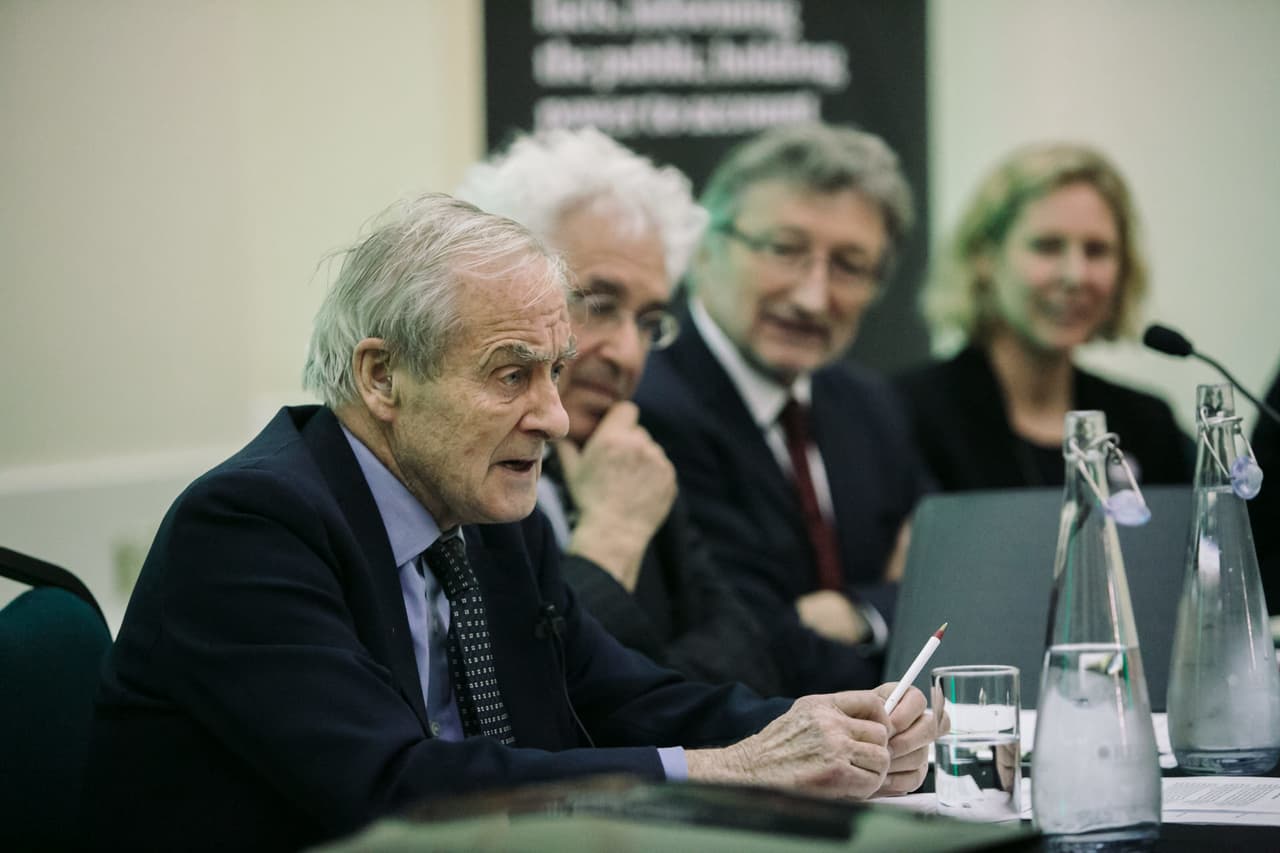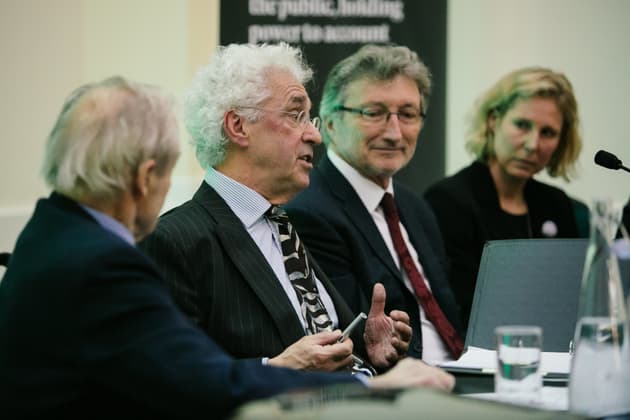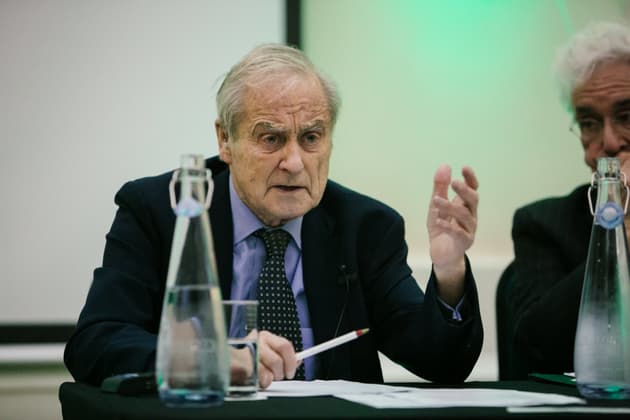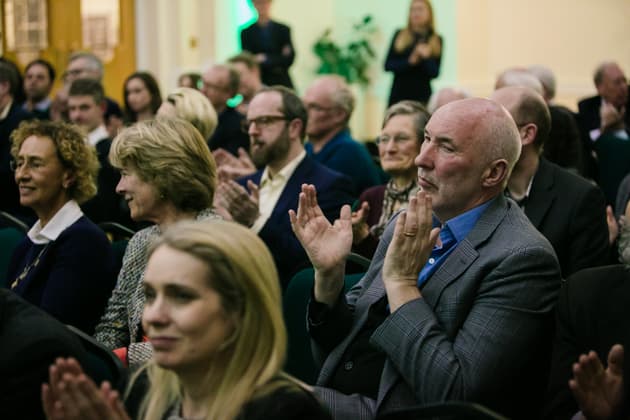
"There is no such thing as 'fake news', only lies"
We must stop pandering to those with an agenda of spreading misinformation and sowing distrust, said former Sunday Times editor Sir Harry Evans on Tuesday - and the first step is to stop using the expression ‘fake news’.
“The words fake news are a joke,” said Sir Harry, an icon of British journalism who travelled from his home in the United States to take part in a debate hosted by the Bureau at Regent's University.
“There is badly written news, there is news I didn’t get, but there is no such thing as fake news - it’s lies.”
The debate on ‘Investigative journalism in a post-truth world',” chaired by Labour Peer Lord Clive Hollick, examined how fact-based, deep reporting can survive the growing crisis facing the media industry.
How can journalists restore trust, asked Lord Hollick, when they have lost credibility as gatekeepers of information in the minds of consumers?
In a video address, journalist and CNN host Christiane Amanpour acknowledged the industry faced dangerous threats in the form of 'fake news' and strongmen around the world attempting to delegitimise the profession.
But "we have also seen a backlash, a bump, a new lease on life seized by civil society and journalism," she said. "We will not surrender to alternative facts, we will not be seduced by the promise of access and we will resist any attempt to intimidate or silence us."
The Bureau’s managing editor Rachel Oldroyd, Cardiff University’s Centre of Journalism director Richard Sambrook and the chairperson of the Independent Press Standards Organisation Sir Alan Moses, proposed different ways forward.
There is a simple answer to how we withstand the torrent of made-up stories being published online, and the disturbing amount of lies coming out of the mouths of elected politicians, said Oldroyd: more journalists and more journalism.
“If we have to check every single thing coming out of the White House we would have to increase the amount of journalists tenfold - and more journalists is the answer,” she argued. “The most sinister thing is how this whole thing is being turned into an attack on the media. It really is having an effect on what people think, and we have to change the debate. We have a genuine opportunity to reinvigorate and reinvent the media.”
 Sir Harry Evans, Sir Alan Moses, Rachel Oldroyd and Richard Sambrook (left to right)
Photo by Amy Scaife
Sir Harry Evans, Sir Alan Moses, Rachel Oldroyd and Richard Sambrook (left to right)
Photo by Amy Scaife
“Fake news is almost a burnt out term”, said Sambrook, and “only a symptom of much bigger structural problems”: the triumph of ’narrative’ over facts, the failings of politicians and the media to connect with the public, and continued outflanking of broadcast and print by internet-based media which has a very different value system. There is also a growing problem with media literacy, he argued - the public has been overtaken by the complexity of communications and the media and no longer understand what they are consuming.
Giving people the tools to distinguish between quality journalism and “rubbish” was the key to overcoming the media’s existential and financial crises, said Sir Alan.
“The light possibly at the end of the tunnel is that the very fact of Trump behaving just like the dictators of old might actually shed light on the value of genuine edited, curated journalism,” he said. “We are all seeking the same thing - a means of underling the importance of edited journalism and the importance of enabling ordinary people to recognise that which is no news at all.”
 Sir Harry Evans edited the Sunday Times from 1967 to 1981
Photo by Amy Scaife
Sir Harry Evans edited the Sunday Times from 1967 to 1981
Photo by Amy Scaife
Transparency and accountability on the part of editors and proprietors was also necessary, said Sir Harry. We see elements of the British press regularly engaging in “monstering” people and organisations, and there must be someone responsible for deciding to do so. “You have to go to them and expose them and their chain of command, and newspapers need be open about what they do and why,” he said.
The alternative model of philanthropically-funded non-profit journalism that is proving so successful in the United States is another way forward, said Oldroyd. The Center for Investigative Reporting, one of the biggest non-profits US news organisations, grew from seven to 70 journalists in seven years, and the Bureau is leading the growth of this model in the United Kingdom. Being free from the pressures of click rates and profit margins means our reporters can focus on telling the stories that really matter, she said, and can spend months on them if necessary.

Bureau founder Elaine Potter - a former Sunday Times journalist who was part of the team which broke the thalidomide scandal - concluded the evening with a call for support for our organisation’s mission.
“At this critical moment in time with the collapse of an effective opposition in the great democracies of Britain and America, and the press under such menacing attack, holding those in power to account has become ever more important,” she said.
“We want to be a force for good, to make things better by questioning everything with hard determination, pursuing the truth and disentangling the lies from the reality.”
Main image of Sir Harry Evans and other panellists in background by Amy Scaife
The Bureau newsletter
Subscribe to the Bureau newsletter, and hear when our next story breaks.




